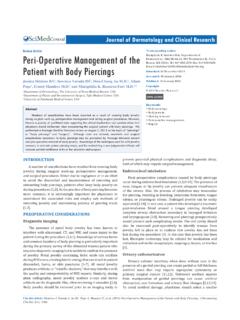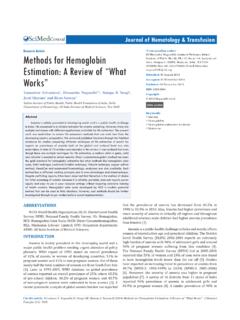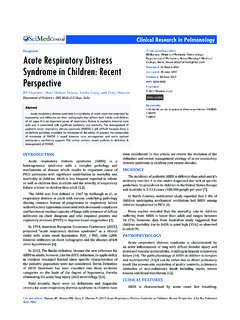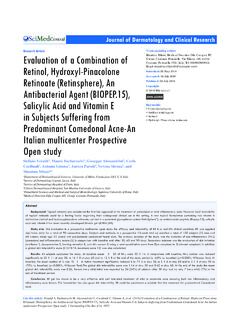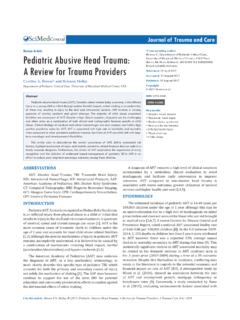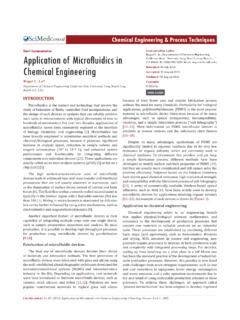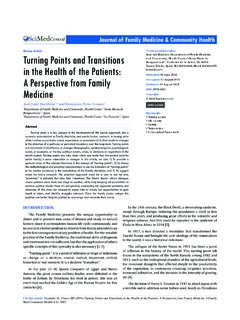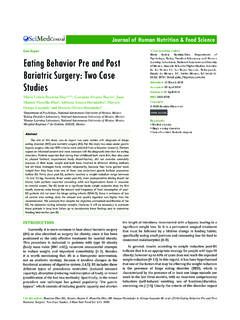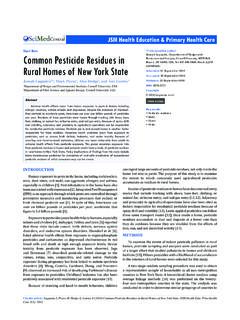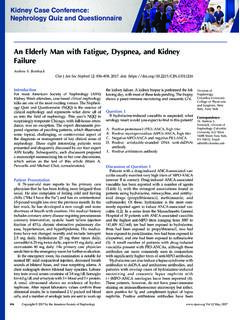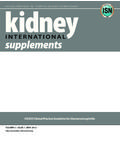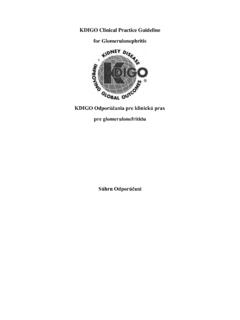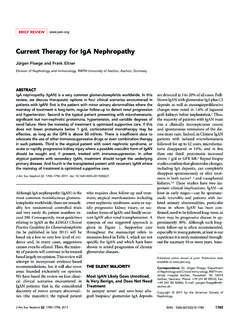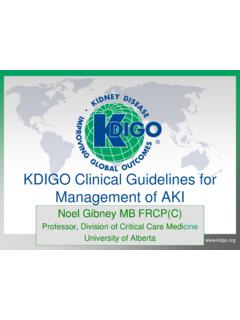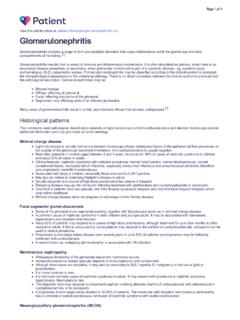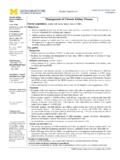Transcription of Overview of Glomerulonephritis Treatment - …
1 CentralBringing Excellence in Open Access Journal of Autoimmunity & ResearchCite this article: Huzmeli C, Candan F (2017) Overview of Glomerulonephritis Treatment . J Autoimmun Res 4(3): 1026.*Corresponding authorCan Huzmeli, clinical of Nephrology, Necip Faz l City Hospital, 46100, Kahramanmaras, Turkey, Tel: 90 344 2282800 / 2109; Email: Submitted: 01 June 2017 Accepted: 21 July 2017 Published: 26 July 2017 Copyright 2017 Huzmeli et : 2573-1173 OPEN ACCESS Keywords Glomerulonephritis Treatment Protein riaResearch ArticleOverview of Glomerulonephritis TreatmentCan Huzmeli1* and Ferhan Candan21 Necip Faz l City Hospital, clinical of Nephrology, Turkey2 Department of Nephrology, Cumhuriyet University, TurkeyAbstractGlomerulonephritis is inflammation of the glomeruli, which are structures in your kidneys that are made up of tiny blood vessels.
2 Glomerular diseases are an important cause of end stage renal disease. Kidney biopsy is mandatory for diagnosis. Treatment with early diagnosis may stopped or prevent end-stage renal failure. Treatment of Glomerulonephritis is regulated by the underlying Glomerulonephritis type. Glomerulonephritis Treatment options include blood pressure control, protein restriction, immunosuppression, and plasmapheresis. In this article we tried to discuss primer Glomerulonephritis (minimal change disease, focal segmental glomerulosclerosis, idiopathic membranous Glomerulonephritis , IgA nephropathy, idiopathic membranoproliferative Glomerulonephritis , C3 glomerulopathy, pauci immune Glomerulonephritis , and antiglomerular basal membrane disease) treatments in the context of CHANGE DISEASEAs Kidney Disease Improving Global Outcomes ( kdigo ) supportive Treatment , the Treatment of hyperlipidaemia with statins and proteinuria Treatment with angiotensin-converting enzyme inhibit r (ACEI) / angiotensin receptor blocker (ARB)
3 In normotensives is not recommended in the first episode. The use of ACEI / ARB can be considered in non-quick remission, frequently recurrent and steroid-dependent patients. Diuretic addition with ACEI or ARB may provide the basis for acute kidney damage [1,2].According to kdigo guidelines , corticosteroids (prednisolone 1mg / kg maximum 80mg or 2mg / kg maximum 120mg daily) are recommended as initial Treatment for patients with nephrotic syndrome. Corticosteroids are recommended for a minimum of 4 weeks if full remission is provided and a maximum of 16 weeks if complete remission is not provided. Steroid therapy is recommended not to exceed 24 months.
4 Cyclophosphamide or calcineurin inhibitors with frequent relapse and steroid dependence, intolerance or contraindication to corticosteroids, are recommended. If prednisolone, cyclophosphamide, cyclosporine and tacrolimus intolerance are present, mycophenolate mofetil (MMF) may be given [1,3,4]. MMF use has been reported to be effective (about 60% 70% of patients) only in small patient cohorts [5,6]. It has been shown that rituximab is effective in the Treatment of patients who are frequently relapsed or steroid-dependent [7,8].FOCAL SEGMENTAL GLOMERULOSCLEROSISIn all Focal Segmental Glomerulosclerosis (FSGS) patients with subnephrotic proteinuria, immunosuppressive therapy is not recommended.
5 ACEI / ARB and sodium restriction are recommended in all FSGS patients. It is thought that immunosuppressives are not injured in cases with intense glomerulosclerosis and interstitial fibrosis. If there is nephrotic syndrome clinic, corticosteroids (prednisolone daily 1mg / kg maximum 80mg or 2mg / kg daily excess maximum 120mg) and immunosuppressive therapy are recommended. If there is intolerance or contraindication to corticosteroids, alternatively calcineurin inhibitors are recommended. However, for calcineurin use, it is necessary not to have significant renal dysfunction at baseline. The combination of high doses of dexamethasone and MMF is recommended for patients who cannot tolerate cyclosporine.
6 The use of steroids in combination with calcineurin therapy increases complete and partial remission of proteinuria in the Treatment of steroid-resistant FSGS. Cyclosporine was effective in Treatment but relapse rates were high after drug withdrawal [1,9,10]. Corticosteroids are used in combination with MMF and has been shown to be effective [11,12]. Several case reports have shown that rituximab is successfully used in adult patients with steroid-dependent but non-steroid-resistant FSGS [13-15].IDIOPATHIC MEMBRANOUS GLOMERULO-NEPHRITISKDIGO suggests immunosuppressive Treatment in the presence of nephrotic syndrome and any of these.
7 Despite the use of antihypertensive and antiproteinuric Treatment for at least 6 months, the proteinuria is always 4 gr / day, provided severe life-threatening symptoms associated with nephrotic syndrome and glomerular filtration rate (GFR) is not less than 25-30mL / min, it is defined as > 30% increase in serum creatinine in 6-12 months period. Membranous Glomerulonephritis (MNG) spontaneous remission is seen in one-third of the patients. If CentralBringing Excellence in Open Access Huzmeli et al. (2017)Email: J Autoimmun Res 4(3): 1026 (2017) 2/4the patient has serum creatinine> mg / dL or GFR <30 mL /min, in patients with reduced renal size by ultrasonography (<8 cm) or in life-threatening serious infections, immunosuppressive therapy is not recommended.
8 kdigo recommends monthly steroid and oral cyclophosphamide in initial Treatment [1].If the amount of proteinuria of MGN is 4 gr/day and renal functions are normal, blood pressure 125 / 75mmHg, ACEI / ARB, diet, follow-up is recommended and immunosuppressive Treatment is not recommended. If the amount of proteinuria is 4 gr/day and <8 gr/kg and renal functions are normal, blood pressure 125 / 75mmHg ACEI / ARB, diet, 6/12 months follow-up is recommended. If these patients persistent proteinuria 4 gr/day in follow-up, corticosteroid + cytotoxic agent or calcineurin inhibitors or rituximab are recommended to patients.
9 If proteinuria is present on 8 gr/day and/or if renal function is impaired, blood pressure 125 / 75mmHg ACEI / ARB and diet follow-up are recommended. For persistent proteinuria, 8gr / day corticosteroid +cytotoxic agent or rituximab or calcineurin inhibitors are recommended. kdigo recommend that initial therapy consist of a 6-month course of alternating monthly cycles of oral and intravenos corticosteroids (intravenous methylprednisolone 1 gr daily for three doses, then oral methyprednisolone mg/kg/d for 27 days), and oral alkylating agents (cyclophosphamide 2 mg / kg / day). It is recommended not to use corticosteroid and MMF monotherapy.
10 In nephrotic syndrome relapses, a remission-induced regimen is recommended. However, if alternate steroid and alkalizing agents are given, the same regimen is recommended only once more. It is recommended that Treatment agents be changed in conditions where initial therapy is resistant [1,16-23]. Plasma exchange, intravenous immunoglobulin (IVIG) and rituximab Treatment have been shown to be successful in Treatment resistant patients [24].IGA NEPHROPATHYC urrent guidelines suggest that patients who have persistent proteinuria 1 g/day despite a trial of the renin angiotensin aldosterone system blockade of adequate duration and good blood pressure control should be considered candidates for immunosuppressive therapy.
